Related Research Articles

The officially stated goals of the foreign policy of the United States of America,including all the bureaus and offices in the United States Department of State,as mentioned in the Foreign Policy Agenda of the Department of State,are "to build and sustain a more democratic,secure,and prosperous world for the benefit of the American people and the international community". Liberalism has been a key component of US foreign policy since its independence from Britain. Since the end of World War II,the United States has had a grand strategy which has been characterized as being oriented around primacy,"deep engagement",and/or liberal hegemony. This strategy entails that the United States maintains military predominance;builds and maintains an extensive network of allies;integrates other states into US-designed international institutions;and limits the spread of nuclear weapons.
The foreign relations of Thailand are handled by the Ministry of Foreign Affairs of Thailand.

The relationship between the People's Republic of China (PRC) and the United States of America (USA) has been complex and at times tense since the establishment of the PRC and the retreat of the government of the Republic of China to Taiwan in 1949. Since the normalization of relations in the 1970s,the US–China relationship has been marked by numerous perennial disputes including the political status of Taiwan,territorial disputes in the South China Sea,and more recently the treatment of Uyghurs in Xinjiang. They have significant economic ties and are significantly intertwined,yet they also have a global hegemonic great power rivalry. As of 2023,China and the United States are the world's second-largest and largest economies by nominal GDP,as well as the largest and second-largest economies by GDP (PPP) respectively. Collectively,they account for 44.2% of the global nominal GDP,and 34.7% of global PPP-adjusted GDP.

Kriangsak Chamanan served as prime minister of Thailand from 1977 to 1980. After staging a successful coup,he was asked to become Prime Minister in 1977. He ruled till 1980 and is credited with "steering Thailand to democracy" in a time where communist insurgents were rampant internally and neighbouring countries turned to communist rule following the communist takeover of Vietnam:South Vietnam,Laos,and Cambodia.

The Center for Strategic and International Studies (CSIS) is an American think tank based in Washington,D.C. From its founding in 1962 until 1987,it was an affiliate of Georgetown University,initially named the Center for Strategic and International Studies of Georgetown University. The center conducts policy studies and strategic analyses of political,economic and security issues throughout the world,with a focus on issues concerning international relations,trade,technology,finance,energy and geostrategy.
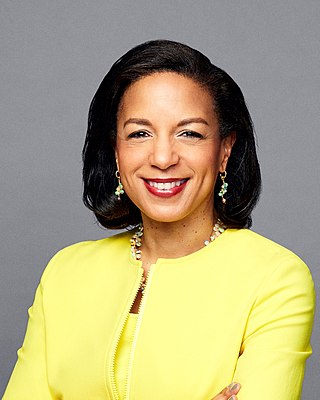
Susan Elizabeth Rice is an American diplomat,policy advisor,and public official. As a member of the Democratic Party,Rice served as the 22nd Director of the United States Domestic Policy Council from 2021 to 2023,as the 27th U.S. Ambassador to the United Nations from 2009 to 2013,and as the 23rd U.S. National Security Advisor from 2013 to 2017.
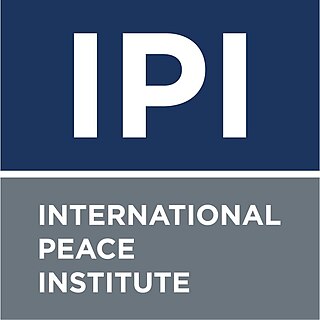
The International Peace Institute is an independent non-profit think tank founded in 1970 based in New York. The institute has a regional office in the Middle East and had a regional office in Europe until 2020.
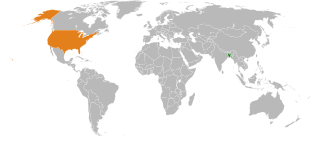
Bangladesh-United States relations are the bilateral relations between Bangladesh and the United States of America. For the United States,Bangladesh is the 38th largest goods supplier and 60th largest export market. For Bangladesh,the United States is the largest export market. The two countries signed a bilateral investment treaty in 1986. U.S. companies are the largest foreign investors in Bangladesh. The U.S. government is the leading contributor of humanitarian assistance in response to the Rohingya crisis. Both nations have announced similar views for a Free and Open Indo-Pacific.
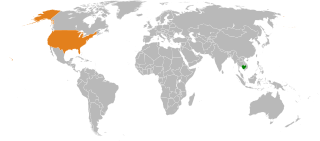
Bilateral relations between the United States and Cambodia,while strained throughout the Cold War,have strengthened considerably in modern times. The U.S. supports efforts in Cambodia to combat terrorism,build democratic institutions,promote human rights,foster economic development,eliminate corruption.
The Josef Korbel School of International Studies at the University of Denver is a professional school of international affairs offering undergraduate,graduate,and doctoral degrees. It is named in honor of the founding dean,Josef Korbel,father of former U.S. Secretary of State Madeleine Albright.

The bilateral relations between the Himalayan Kingdom of Bhutan and the Republic of India have been traditionally close and both countries share a "special relationship",making Bhutan a protected state,but not a protectorate,of India. India remains influential over Bhutan's foreign policy,defence and commerce. Bhutan is the largest beneficiary of India's foreign aid.

Thomas Edward Donilon is an American lawyer,business executive,and former government official who served as the 22nd National Security Advisor in the Obama administration from 2010 to 2013. Donilon also worked in the Carter and Clinton administrations,including as chief of staff of the U.S. State Department. He is now Chairman of the BlackRock Investment Institute,the firm's global think tank.

The term Obama Doctrine is frequently used to describe the principles of US foreign policy under the Obama administration (2009–2017). He relied chiefly on his two highly experienced Secretaries of State—Hillary Clinton (2009–2013) and John Kerry (2013–2017)—and Vice President Joe Biden. Main themes include a reliance on negotiation and collaboration rather than confrontation or unilateralism.
U.S. President Barack Obama's East Asia Strategy (2009–2017),also known as the Pivot to Asia,represented a significant shift in the foreign policy of the United States since the 2010s. It shifted the country's focus away from the Middle Eastern and European sphere and allowed it to invest heavily and build relationships in East Asian and Southeast Asian countries,especially countries which are in close proximity to the People's Republic of China (PRC) either economically,geographically or politically to counter its rise as a rival potential superpower.
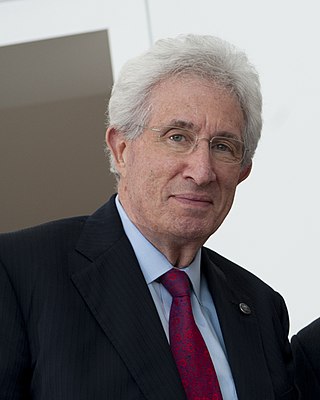
Richard Harvey Solomon was an American diplomat and academic who served as Director of Policy Planning from 1986 to 1989,Assistant Secretary of State for East Asian and Pacific Affairs from 1989 to 1992,and U.S. Ambassador to the Philippines from 1992 to 1993. In September 1993,he became president of the United States Institute of Peace,a position he held until September 2012. He subsequently joined the RAND Corporation as a Senior Fellow.
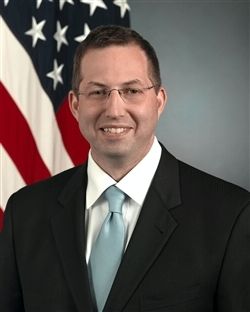
Derek James Mitchell is an American diplomat with extensive experience in Asia policy. He was appointed by President Barack Obama as the first special representative and policy coordinator for Burma with rank of ambassador,and was sworn in by Secretary of State Hillary Clinton on October 2,2011. On June 29,2012,the U.S. Senate confirmed him as the new United States Ambassador to Burma. On September 4,2018,Mitchell succeeded Kenneth Wollack as president of the National Democratic Institute,a position he served until September 2023.

Sung-Yoon Lee is a scholar of Korean and East Asian studies,and specialist on North Korea. He is a fellow at the Woodrow Wilson International Center for Scholars. He is the former Kim Koo-Korea Foundation Professor in Korean Studies and assistant professor at the Fletcher School of Law and Diplomacy,Tufts University. He was also an associate in research at the Korea Institute,Harvard University. and a research fellow at the National Asia Research Program.

W. Patrick Murphy is a career U.S. diplomat. A Senior Foreign Service Officer,he served as the Principal Deputy Assistant Secretary of State for the Bureau of East Asian and Pacific Affairs from 2018 to 2019,fulfilling the duties of Acting Assistant Secretary,and Deputy Assistant Secretary of State for Southeast Asia and Multilateral Affairs,2016–2018. He previously served as Chargéd'affaires and Deputy Chief of Mission in the Kingdoms of Thailand and Lesotho. He was nominated on January 16,2019 to be Ambassador Extraordinary and Plenipotentiary of the United States of America to the Kingdom of Cambodia.
References
- ↑ "Frank Jannuzi President and CEO". The Maureen and Mike Mansfield Foundation. Archived from the original on 2016-03-04. Retrieved 2016-02-23.
- ↑ Small, Vanessa (25 March 2012). "Behind the career: Frank Jannuzi of Amnesty International". Washington Post. Retrieved 11 June 2012.
- ↑ Rogin, Joseph. "Frank Jannuzi to head Amnesty International D.C. office". Foreign Policy. Retrieved 11 June 2012.
- ↑ "Obama's Korea Policy Discussion with Frank Jannuzi on 10/2". Asian Americans for Obama. Retrieved 12 June 2012.
- ↑ "Amnesty International USA Announces Frank Jannuzi, New Head of the Washington, D.C., Office". Amnesty International USA. Retrieved 11 June 2012.
- ↑ "Frank Sampson Jannuzi". Council on Foreign Relations. Retrieved 11 June 2012.
- ↑ Jannuzi, Frank. "Amnesty Blog Archive". Amnesty International USA. Retrieved 12 June 2012.
- ↑ Jannuzi, Frank (5 June 2012). "Amnesty International wants Mr. Bush held to legal standards". Washington Post.
- ↑ Jannuzi, Frank (2012-05-02). "Obama's Smart Diplomacy in China". Foreign Policy.
- ↑ Jannuzi, Frank. [U.S.-China Relations: An Affirmative Agenda, a Responsible Course "U.S.-China Relations: An Affirmative Agenda, a Responsible Course: Independent Task Force Report No. 59"]. Council on Foreign Relations Press.
{{cite web}}: Check|url=value (help) - ↑ Jannuzi, Frank (2001). "Discussion of 'US Global Strategy in the Post-Cold War Era'". Journal of Contemporary China. 10 (27): 317–320. doi:10.1080/10670560120045797. S2CID 155060294.
- ↑ Jannuzi, Frank (1999-01-13). "Can the United States Cause the Collapse of North Korea? Should We Try?". Council of Foreign Relations. Retrieved 2023-01-16.